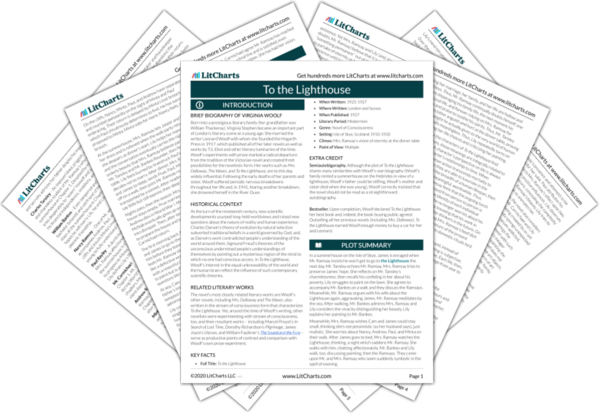Summary
Analysis
Sailing off, James and Cam are silently united in stony resistance to their father’s tyranny. They had hoped the voyage would fail but the boat sails off and Mr. Ramsay is happy to be moving quickly and listens with relish to Macalister (who mans the boat) describe the great storm at Christmas. James steers and mans the sail, anticipating Mr. Ramsay’s criticism at even the slightest mistake he might make. Watching her father, Cam feels proud of him despite her and James’ pact of silent resistance. She admires his courage and adventurousness and thinks that, had he been present at the great storm, “he would have launched the lifeboat.”
Although James and Cam are inwardly furious and resentful of Mr. Ramsay, their father, who has never been a very good reader of people’s interior states, is blithely happy and seems unaffected by their mood. And even as she resents her father, Cam admires the same traditionally masculine qualities in Mr. Ramsay that Mrs. Ramsay admired in him in Chapter 1.
Themes
Quiz
Test Yourself
Mr. Ramsay points out the summerhouse on the shore, which looks “peaceful” and “unreal” to Cam. Mr. Ramsay sees a desolate, aged image of himself pacing the terrace of the distant summerhouse. He imagines being “bereft” and being given women’s sympathy. He recites a melancholy couplet. Meanwhile, Cam inwardly feels the only reality is the boat they’re on. The reality of their life on that faraway shore is “rubbed out,” “past.” Mr. Ramsay teases Cam for looking at the wrong shore and thinks how hopelessly vague women’s minds are, though that vagueness is also their charm.
For Cam, distance extinguishes the meaning of the summerhouse and leaves it looking unreal. For Mr. Ramsay, distance romanticizes the meaning of the summerhouse and allows him to imagine himself as a more pitiable figure: a grieving, older man. Mr. Ramsay expresses his longing for a woman’s attention by reciting literature. Mr. Ramsay is still convinced of and charmed by women’s “foolishness,” as he was with Minta in Chapter 1.
Themes
Literary Devices
Quiz
Test Yourself
Wanting to make Cam smile, Mr. Ramsay asks about the puppy. Cam feels trapped, wanting to respond and please her father but fearful of breaking her compact with James. James inwardly fears she’ll cave into Mr. Ramsay and recalls a blurry memory of his mother turning away from him to attend to a man. Cam compromises by responding to her father, but only partially and sullenly.
Cam’s barely articulated response to Mr. Ramsay conveys nothing of the genuine interior anguish that lies behind her words. As Mrs. Ramsay feared in Chapter 1, James has retained his childhood disappointment and resentment of his father across time.
Themes
Quiz
Test Yourself
Mr. Ramsay gives up on winning over Cam and takes out his book. Cam thinks how she loves and admires Mr. Ramsay above all other people for “his voice,” “his haste,” “his oddity,” “his passion,” his outspokenness. Still his imperious “dominance” remains intolerable and her painful childhood memories of it still make her wake up in the night “trembling with rage.”
Cam’s conflicted feelings towards her father demonstrate the complexity of interior life. At every moment, internal thought encompasses remembered emotions as well as the fleeting, changing feelings of present experience.
Themes
Quiz
Test Yourself
Get the entire To the Lighthouse LitChart as a printable PDF.













